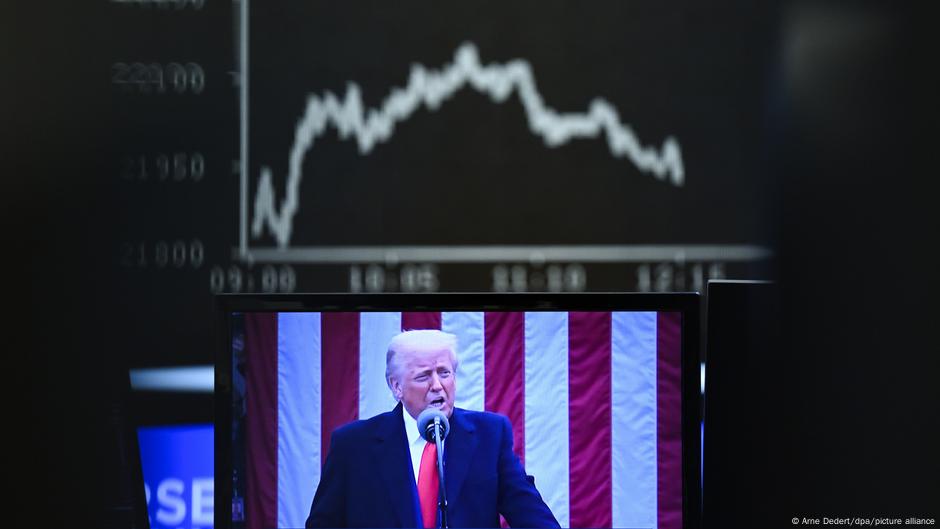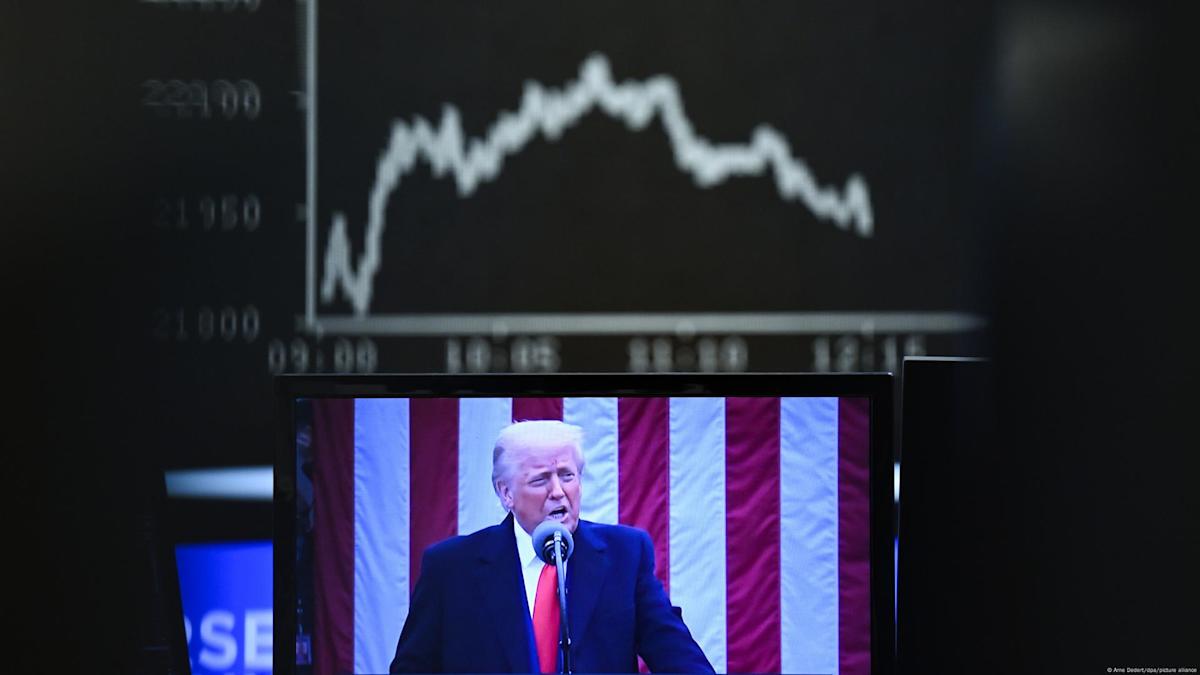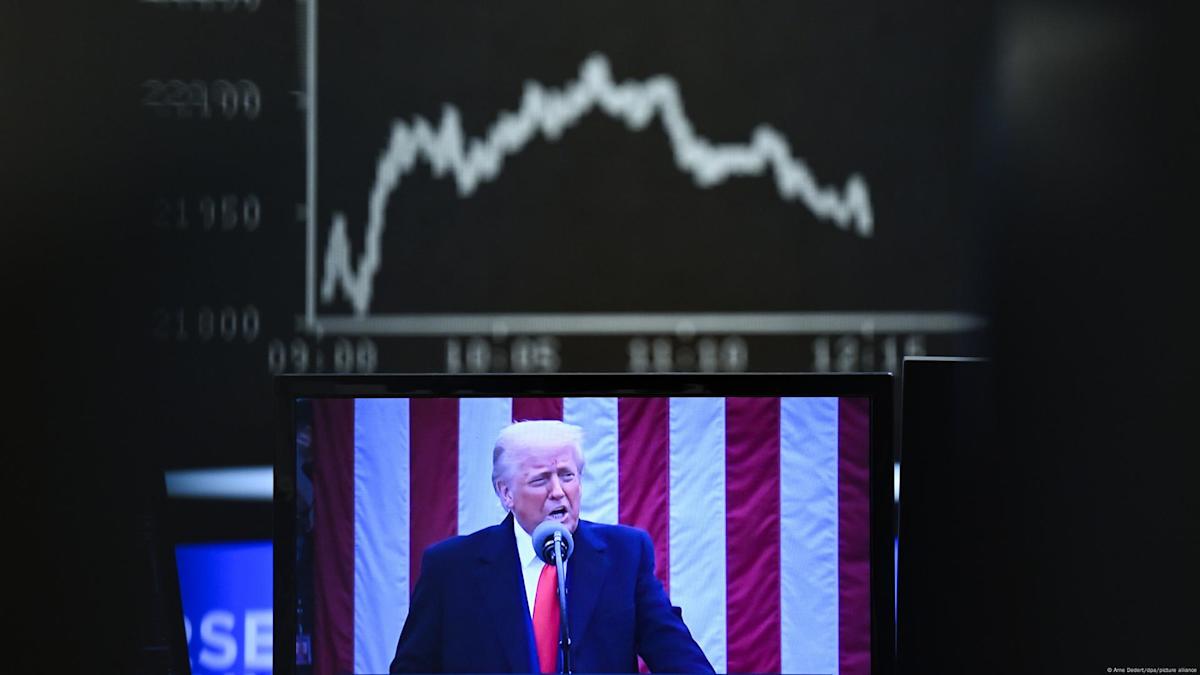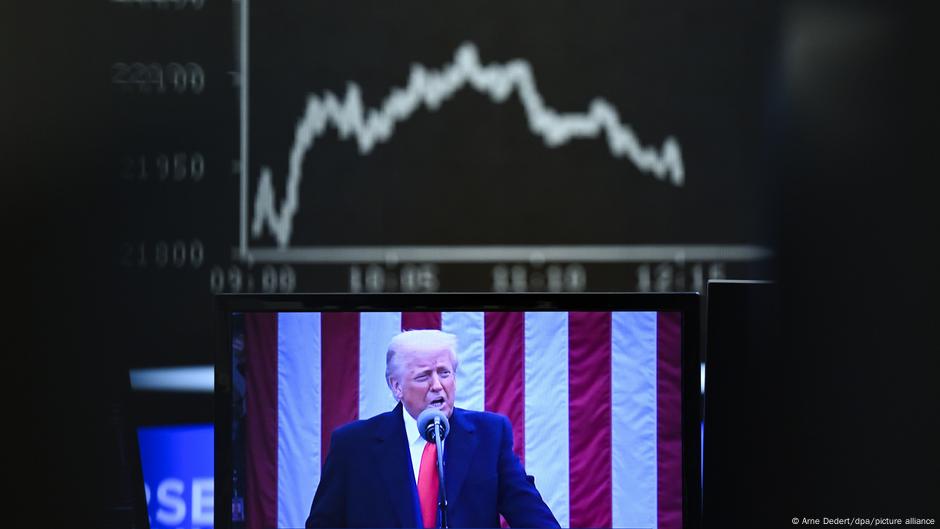The global trade scene has shifted once again. President Trump, in a move that has sent ripples across international markets, announced fresh tariffs, triggering a scramble among world leaders to assess the fallout and chart a course forward. The implications are far-reaching, touching every nation that relies on the delicate balance of global commerce. As tensions rise and economic anxieties surge, Unionjournalism examines the immediate and long-term consequences of these new tariffs and the strategies world leaders are employing to navigate this turbulent landscape.
Global Markets Tremble as Trump Imposes New Tariffs
The Fallout on Wall Street

The US stock market experienced a sharp decline on Thursday following President Trump’s announcement of new tariffs on nearly every country and territory worldwide. The broad-based S&P 500 index closed down 4.8%, marking its largest loss since June 2020 when the COVID-19 pandemic triggered a global economic downturn. The tech-heavy Nasdaq also suffered its worst trading day since March 2020, dropping 6%. Meanwhile, the Dow Jones index fell 4%. The only sector that demonstrated resilience was consumer staples, which comprises companies that sell essential food items.
Harvard University economist Jeffrey Frankel commented on the market reaction, stating, “I think the stock market, particularly the US stock market, perhaps was overvalued at the beginning of the year. I will say that. But what our president has done is really destroy — or at least with regard to US participation if not the global system — the entire rules-based, multilateral open trading system that we’ve had for the last 80 years, which has given the world, including the US, an historic, unprecedented period of relative peace and prosperity. I think he’s damaged that very seriously.”

International Reactions of Dismay
President Trump’s announcement of “reciprocal tariffs” ranging from 10% to 50% has sparked widespread dismay among global players.
- European Commission President Ursula von der Leyen expressed grave concerns, stating that the fallout from the tariffs, including a new 20% tariff on EU exports, “will be dire for millions of people.”
- Germany called for unity within the EU in its response to these trade measures from the US.
- Lesotho, facing a 50% tariff on its imports — the highest for a single country in Trump’s package — announced its intention to send a government delegation to the United States “urgently” to engage with US executives and plead its case. Trade Minister Mokhethi Shelile highlighted the potential for immediate factory closures and job losses, emphasizing the need to diversify trade partners.
- The administration argues that foreign imports are hurting American industries and workers, and that the tariffs will help to create jobs and stimulate economic growth.
- The tariffs are being imposed to address the perceived threat of foreign imports to national security.
- The administration claims that the tariffs are necessary to protect American industries from unfair competition and to level the playing field.
- The administration has claimed that the tariffs are a necessary response to unfair trade practices, but Trump has also suggested that they are a bargaining chip to be used in trade negotiations.
- The contradictory messaging has created confusion and uncertainty among trade partners and businesses.
- The administration’s strategy and goals have been called into question.
- The tariffs could disrupt global supply chains and push up consumer prices.
- Many companies rely on imported goods and materials, and the tariffs could make it more expensive for them to do business.
- The tariffs could have a significant impact on the economy, including higher prices for consumers and a decline in economic growth.
- Trade partners could consider negotiating with the US to address trade concerns and avoid tariffs.
- Trade partners could diversify their trade partnerships to reduce dependence on the US market.
- Trade partners could impose retaliatory tariffs on US goods to push back against the US tariffs.
- The tariffs could lead to a decline in economic growth as trade is disrupted and supply chains are disrupted.
- The tariffs could push up consumer prices as companies pass on the costs of the tariffs to consumers.
- The tariffs could shift trade patterns as companies look for new markets and supply chains.
- The tariffs could lead to job losses as companies struggle to compete with higher tariffs.
- The tariffs could lead to factory closures as companies are unable to afford the higher costs of production.
- The tariffs could lead to higher prices for consumers as companies pass on the costs of the tariffs.
Echoes of Past Trade Wars

Trump’s latest move echoes historical trade disputes and their ramifications. Analysts are drawing comparisons to previous trade wars, such as the Smoot-Hawley Tariff Act of 1930, which is widely considered to have exacerbated the Great Depression. The current situation raises concerns about a potential return to protectionist policies and the possibility of a global trade war.
Trump’s “National Emergency” and the Shifting Trade Landscape
Trump Says “Things Are Going Very Well” as Stock Markets Fall
Despite the significant drop in US stock markets on Thursday following his tariff announcement, President Trump maintained a positive economic outlook. “I think it’s going very well,” he stated as he departed the White House for one of his Florida golf clubs. “The markets are going to boom, the stock is going to boom, the country is going to boom,” he asserted.
The president’s comments, made aboard Air Force One, came shortly after his senior trade adviser Peter Navarro contradicted them, stating on CNBC that the tariffs were not intended for negotiation. “This is not a negotiation. This is not that. This is a national emergency,” Navarro emphasized.
US Says Tariffs Should Push Partners to Change Trade Policies
US Commerce Secretary Howard Lutnick expressed expectations that countries would re-evaluate their trade policies in response to Trump’s announcement. In an interview with CNBC, Lutnick stated, “I expect most countries to start to really examine their trade policy towards the United States of America, and stop picking on us.”
Lutnick did not, however, indicate whether the United States would be willing to lower its tariffs in exchange for concessions from other nations.
The Administration’s Justification
The White House has justified the imposition of tariffs by citing unfair trade practices and national security concerns. According to the administration, the tariffs are necessary to protect American industries and workers from unfair competition and to address the perceived threat of foreign imports to national security.
From a legal perspective, the tariffs are being imposed under Section 232 of the Trade Expansion Act of 1962, which allows the president to impose tariffs on imports that pose a national security risk. The administration has also cited the General Agreement on Tariffs and Trade (GATT), which permits countries to impose tariffs on imports that are deemed to be unfairly traded.
Economically, the tariffs are being justified as a means to level the playing field and to give American industries a fair chance to compete in the global market. The administration argues that foreign imports are hurting American businesses and workers, and that the tariffs will help to create jobs and stimulate economic growth.
Arguments Underpinning the Administration’s Stance
However, critics argue that the tariffs will have unintended consequences, such as higher prices for consumers and retaliatory measures from other countries. They also argue that the administration’s claims about unfair trade practices and national security concerns are exaggerated and unsupported by evidence.
The tariffs have sparked widespread criticism from business leaders, trade experts, and foreign governments. Many have argued that the tariffs will harm American businesses and workers, and that they are an overreach of presidential power.
Contradictory Signals: Negotiation or Ultimatum?
The administration’s justification for the tariffs has been complicated by contradictory signals from Trump and his advisors. While the administration has claimed that the tariffs are a necessary response to unfair trade practices, Trump has also suggested that they are a bargaining chip to be used in trade negotiations.
In a press conference, Trump said that the tariffs were a “national emergency” and that they were not up for negotiation. However, less than an hour later, he told reporters that he was open to using tariffs to negotiate with other countries.
This contradictory messaging has created confusion and uncertainty among trade partners and businesses. It has also raised questions about the administration’s strategy and the goals of the tariffs.
Tension Between National Emergency and Negotiation
The tension between the administration’s claims of a “national emergency” and the openness to using tariffs as a bargaining chip has created uncertainty and confusion. It has also raised questions about the administration’s strategy and the goals of the tariffs.
Experts argue that the tariffs are a high-stakes gamble that could backfire and harm American businesses and workers. They also argue that the administration’s contradictory messaging has created uncertainty and confusion, and that it has undermined trust in the US trade policy.
The Potential for Escalation
The tariffs have the potential to escalate into a full-blown trade war, with retaliatory measures from other countries and a spiraling cycle of tariffs and counter-tariffs. This could have significant economic consequences, including higher prices for consumers and a decline in economic growth.
The potential for escalation is high because the tariffs have already sparked retaliatory measures from other countries. For example, the European Union has announced plans to impose tariffs on US goods, while China has vowed to retaliate against US tariffs.
Ripple Effects on Global Supply Chains and Consumer Prices
The tariffs have the potential to disrupt global supply chains and push up consumer prices. This is because many companies rely on imported goods and materials, and the tariffs could make it more expensive for them to do business.
Experts argue that the tariffs are a high-stakes gamble that could backfire and harm American businesses and workers. They also argue that the administration’s contradictory messaging has created uncertainty and confusion, and that it has undermined trust in the US trade policy.
Looking Ahead: Navigating Uncertain Waters
As the tariffs continue to unfold, trade partners and businesses must navigate uncertain waters. This includes considering potential strategies for responding to the tariffs, ranging from negotiations to diversification of trade partnerships.
Experts argue that the tariffs are a high-stakes gamble that could backfire and harm American businesses and workers. They also argue that the administration’s contradictory messaging has created uncertainty and confusion, and that it has undermined trust in the US trade policy.
Policy Options for Trade Partners
The long-term impact of the tariffs on global trade is unclear. However, experts argue that the tariffs could have significant consequences, including a decline in economic growth and a push up in consumer prices.
The Long-Term Impact on Global Trade
The tariffs could have significant long-term consequences for global trade. This includes a decline in economic growth, a push up in consumer prices, and a shift in trade patterns.
The human cost of the tariffs is also significant. This includes job losses, factory closures, and higher prices for consumers. Experts argue that the tariffs are a high-stakes gamble that could backfire and harm American businesses and workers.
The Human Cost
The tariffs have the potential to harm American businesses and workers. This includes job losses, factory closures, and higher prices for consumers.
Conclusion
Conclusion: Trump’s Tariffs Spark Global Debate and Uncertainty
In the aftermath of Donald Trump’s new tariffs, leaders from around the globe have taken a significant stand, often walking a delicate balance between economic interests and diplomatic relations. The move has sparked intense debates, raised concerns about trade tensions, and prompted calls for greater cooperation. Trump’s tariffs, which target billions of dollars in imports, have also led to a surge in retaliatory measures from other countries, including China. The consequence is a complex web of trade disputes that threaten to destabilize global economies.
The significance of Trump’s tariffs lies in their far-reaching impact on international trade, from the supply chains of multinational corporations to the livelihoods of small business owners. The tariffs will undoubtedly lead to increased costs for consumers, potentially affecting industries that rely heavily on exports, such as technology, automotive, and agricultural sectors. Moreover, the trade tensions have raised questions about the long-term consequences of a trade war, including potential economic contraction and social unrest. As the international community grapples with the implications of Trump’s tariffs, it is essential to consider the potential consequences of a global economic downturn.
As the world navigates this complex landscape, leaders must tread carefully, balancing their economic interests with the need for diplomatic cooperation. The future of international trade will depend on the ability of nations to navigate this delicate balance and find mutually beneficial solutions. As the US and other countries continue to engage in trade negotiations, one thing is clear: the world will be watching, and the consequences of Trump’s tariffs will be felt for years to come.
The world is at a crossroads, and the decisions made in the coming weeks and months will have far-reaching implications for global economies, politics, and social stability. As we navigate this complex landscape, it is crucial that we prioritize dialogue, cooperation, and a nuanced approach to addressing the challenges posed by Trump’s tariffs. The world is waiting with bated breath to see how the international community responds to this new reality, and the outcome will be shaped by the collective efforts of nations around the globe.
